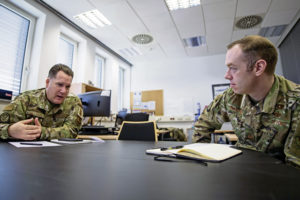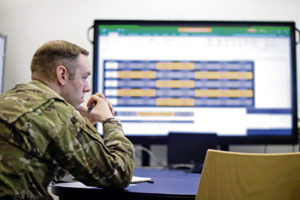The 435th Contingency Response Support Squadron air advisors conducted a virtual meeting with Bulgarian air force personnel from Graf Ignatievo Air Base to discuss force protection capabilities, May 19.
In preparation for the arrival of the Bulgarian air force’s F-16 fleet, the Bulgarian force protection team at Graf Ignatievo Air Base wanted to find ways to utilize their manning that maximizes security for their base and allocates time for essential training.
The air advisors provided potential courses of action, enabling the team to achieve their goals while sustaining the new assets when they arrive.

“The overall goal was to get after their desires of combining several force protection teams into one unit, and show them how to utilize their manning in a different way that’s more efficient to secure their airbase,” said Master Sgt. Daniel Williams, 435th CRSS air advisor flight chief.
By assessing the information provided by the Bulgarian force protection team, the air advisors developed a few possible schedules to coincide with the proposed unit structure.
“The Bulgarian force protection team is getting a tailored solution for one of their challenges, and we do our very best to ensure the products we provide them are things they can use,” said Capt. Daniel McKeown, 435th CRSS assistant director of operations. “Now we can give them a product and walk them through the thought process, and explain to them why we recommended these three different schedules.”
Normally, air advisors would discuss topics such as these at the ally’s base in their home country. However, COVID-19 put a stop to air advisor missions involving travel. Through virtual means, McKeown and Williams were able to screen-share their resources to the force protection team while walking them through their thought process.
“I think doing this (video teleconference) only increases that partnership ten-fold,” Williams said. “It proves to them that we aren’t just sitting here at our base focused on ourselves. It shows them that even during this time, we are still focused on our partnership — on strengthening our team. The more they can increase their own footprint in this theater allows us to decrease our activity in that area which saves us time, money, and our blood and treasure of our Airmen.”
McKeown added that it saves the host nation time and money as well because hosting another nation’s military can be resource intensive. By conducting the teleconference, the air advisors were able to accomplish the mission while furthering the partnership. However, discussing these topics would not be as effective if they didn’t already have a relationship established in the first place.
“You can’t replace the boots-on-the-ground partnership, but once the partnership is built, this is proof that we can continue to move forward,” Williams said.
Williams said as the first-ever virtual mil-to-mil engagement, this has a chance of shaping the way the Bulgarian force protection teams safeguard their air bases across their entire air force.

Between the experiences and knowledge from both U.S. and Bulgarian air forces, the team can come to a solution which best suits the needs of the allied partners.
“That’s our goal; to get them to understand that our way might not be the right way, their way might not be the right way either, but there’s a hybrid that we have to find that’s going to work best for them,” Williams said.
The air advisors plan to continue missions through virtual means in the future, even after the stop movement is lifted. However, it will not replace their normal missions as it is most effective to meet face-to-face with allied partners.
“At the end of the day, as our allies, we want to know what their concerns are, and we want to be able to show their concerns are our concerns because we’re in this together as a partnership for peace,” Williams said. “Whenever we can find that commonality and get those interests to align, it’s a huge win for us.”


